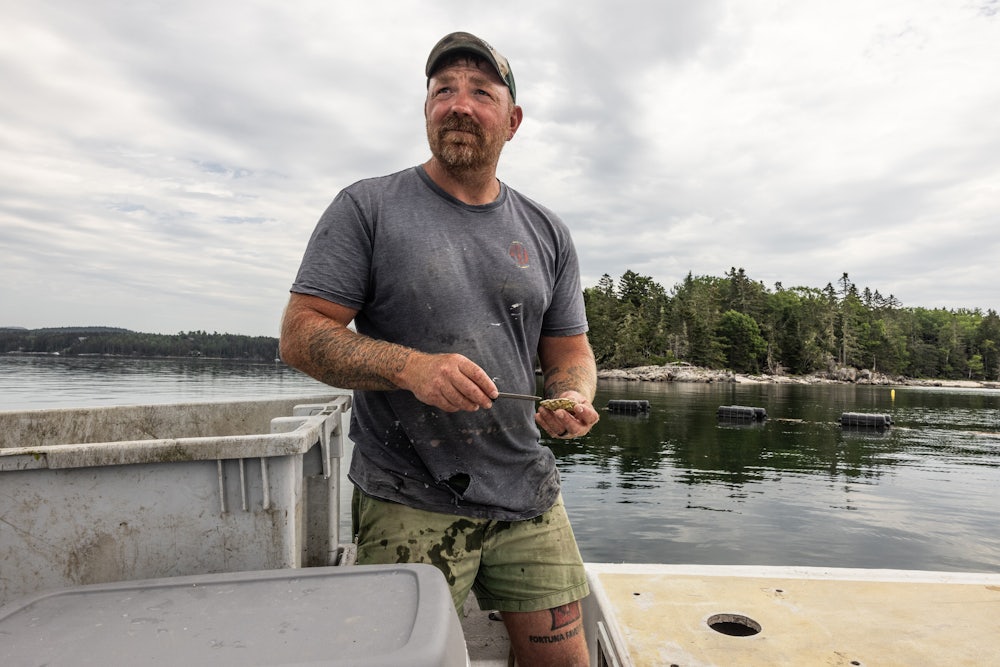At 8 a.m., Taunton Bay is glassy—the air cool but salty enough to make your nose wrinkle. A man in rubber boots, canvas pants, and a black T-shirt worn to gray, carrying a large cooler on his shoulder, passes me on the beach. “Ya here for Graham?” he says, his Maine accent looping the first two words together.
“Yup,” I reply.
“Good man,” he says, continuing on his way.
I flew here to profile Graham Platner because his announcement video for his Senate campaign (produced by the same company that’s done work for Zohran Mamdani) struck the same deep chord in me as it did in the millions of others who watched it. His plainspoken fury at the billionaire economy broke through the noise of the Trump presidency to capture extravagant donations from voters (the campaign says they’re closing in on $1 million) and the attention of media outlets across the country.
That he’s been added as speaker at Bernie Sanders’s anti-oligarchy rally on Labor Day is unsurprising. That Sanders has had to move the rally to a bigger venue since Platner got on the bill is telling.
Aboard his boat, I break the ice by asking Platner to explain exactly how oyster farming works. His answer begins 5,000 years ago, with members of the Passamaquoddy tribe collecting oysters in the shallows as a major part of their diet: “It’s a source of protein that doesn’t run away when you try to catch it.” Easy to transport in its own protective case and able to survive out of the water for days, Roman armies carried them in rucksacks on campaigns. In the 1800s, New Yorkers ate about one million oysters a day, often picking them up for a convenient snack from carts on street corners, like hot dogs or a breakfast sandwich. They became a status symbol as their numbers dwindled.
Today, the East Coast has 5 percent of the oyster population it did at the turn of the twentieth century. The modern northeastern oyster trade exists because Rutgers University scientists saved the industry, breeding a disease-resistant strain of Crassostrea virginica in 1960.
Letting Platner’s lesson wash over me, it’s clear that the oyster is praxis as much as a menu item. From Indigenous subsistence to working-class staple, a species decimated by extractive capitalism and the predilections of the elite, brought back to life by a public institution as a sustainable resource. It’s a case study in how labor, science, and regulation can still stitch together a community and economy.
He ends his story explaining that the oysters we’re about to eat are four or five years old, grown from “seed oysters” not even the size of a thumbnail. He bends over to haul up the crates, T-shirt riding up. Platner is not a candidate who checks if his boxers are showing when a reporter is watching.
He pops open half a dozen to enjoy with our coffee, and they are the most delicious oysters I have ever eaten: The tart brine dissolves into fruit-like sweetness as your teeth break the skin.
Between the gentle morning sun, the complex flavors of the oysters, and lulling water, it is easy to believe Platner when he says that he hasn’t paid himself to work for his company since he took it over five years ago. Anyone would do this job for free. His wife and business partner take checks for their labor, but his contribution to the household comes in the form of checks from the Veterans Administration based on his 100 percent disabled status.
I post a picture of me enjoying Platner’s oysters (call it accepting a bribe if you want, I call it research) and almost immediately get a text from my friend the comedian, author, and part-time Maine resident John Hodgman: “I see you’re hanging with Graham!” I ask how they know each other, and John says Platner shucks oysters at a nearby wine store. “I’ve only ever chatted with him there and on text,” Hodgman writes. “Mostly re: oysters. But I always liked him and am thrilled he’s running.”
These unprompted endorsements happen throughout my visit: There’s Hodgman, the guy on the beach, both times I stop for coffee at Dunbar’s Market, and several people as I’m standing with a notebook at Platner’s elbow during the AFL-CIO event that he attends as a supporter and not a speaker. I feel a little like I’m the butt of a practical joke—or that the campaign is spending some of its enormous first-week haul on hiring actors to play these very specific parts. “I begged him to run for office last winter,” one attendee at a meet-and-greet house party tells me.
What position?
“Anything,” he replies. “And you know what he said to me? ‘Absolutely not.’”
I’m surprised, only because it is hard to get a short answer from Platner about anything, including why he ultimately decided to run for office: “People getting kidnapped in the state of Maine by masked federal agents,” “My friends can’t afford housing,” “authoritarianism,” and outrage over the Democratic Party’s inability to meaningfully stop, or even impede Donald Trump’s destruction of every American institution that matters. “Democrats talking about how they’re fighting fascism,” he wrote in a post on X. “It’s such bullshit. We’re not idiots. Everyone knows most of them aren’t doing jack shit right now to fight back.”
And, of course, he wants to set fire to the oligarchy.
He can’t name a single issue or event that changed his mind since his friend asked him to run for something last winter. It’s not that he’s new to politics—he’s volunteered for food banks and veteran causes, worked in mutual aid organizations across the state. He’s the local harbormaster. Platner used to say running for office seemed like a distraction—and, frankly, too much of a long shot. Now he’s letting his passion rule him. “And,” he says, name-checking his wife, “Amy’s grateful she doesn’t have to listen to me rant anymore, now that I’m ranting at other people all day.”
Someone asks Platner why bother running as a Democrat. He says the infrastructure for fundraising would not be as robust if he ran as an independent, and, besides, running as a Democrat in Maine isn’t the campaign-killer it would be elsewhere. “Also,” he says, “at my core, I’m a Democrat. I grew up as a Democrat, I voted Democratic, my whole life.”
He cautions: “I want to make it clear, I’m not running as a reform candidate here. We need to take the party back. We need to build power and leverage power, both in the party and the institutions of power, to get what we need.”
Platner is blunt, even proud, about how much he’s benefited from government programs. He wants everyone to benefit from them. He went to George Washington University on the GI Bill, he can afford a mortgage on his $250,000 home and to do a job he loves because of those disability checks. His health care is free, after a fashion—he paid for it with four tours in Iraq and Afghanistan during the grimiest slog of the war on terror (fighting in Fallujah and Ramadi, among other places).
“I came back struggling with the kinds of things you struggle with when you’ve been blown up a few times,” he says. He has two herniated disks and was diagnosed with a traumatic brain injury and post-traumatic stress syndrome. “But watching your friends die as the bar to meet for decent health care is disgusting.”
He protested the Iraq War before he enlisted in it. When I ask about the apparent contradiction, he shrugs: “I thought I could do some good. And I wanted to play soldier. I might have read too much Hemingway.”
He insists the Marines are full of men like him, grunts who love both the anarchic politics of Black Flag and the grinding discipline of active duty. It reminds me of some boys I grew up with—young men for whom joining the military and radical protests were both ways of proving you could take more than most people could handle.
He still thinks of community organizing as the ultimate test of endurance—the same long-haul, no-glory, high-pain-threshold ethos that drew him to both punk rock and the Marines. “I know people who organized against the Vietnam War and today they live in a world that is in some ways objectively worse.
“And they’re not bitter,” he says. “If you believe in a better world, you need to get right with the fact that you may never see it.” At this point, he sniffles. “And now I’m going to cry a little. I can do that because I’ve had a lot of therapy.”
We meet up for coffee at his house. Its blue paint is peeling in places, and it is surrounded by a wild thicket of head-high flowers and boating equipment in various stages of repair. Platner says that if he cocks his head just right, he can see the bay from the upstairs bedroom window. “And if I see white caps, I get to go back to bed.”
Platner greets me at the door in shorts and a thin fleece half-zip that strains a bit at his stout chest and bulky arms. I don’t see him without a baseball cap much, but when he takes it off to run his hand over his head, his bleached strawberry-blonde hair has the texture of and is arranged like a haystack. He’s barefoot and drinking coffee out of a Bernie mug that’s both stained and faded. “Not for show,” he promises, and points to the Bernie bumper sticker on his refrigerator, itself buried under flyers for arts and crafts shows, fundraisers, and a poster for Indigenous rights. His two dogs are underfoot. There’s a loving but cautious tan mutt (Gryffin, 8 years old) and a goofy, exuberant black lab (Zevon, after Warren, a year and a half) who tosses his wriggling body around with the floppy gracelessness of an animal born to be in the water.
Volunteers trickle in and out while we talk, picking up a dwindling amount of flyers that were only printed a week ago. He says they’re seeing about 300 volunteers sign up every day.
In the unlikely event that pace continues to primary day in June 2026, he’ll have signed up about the number of people he needs to win the nomination, if voting trends continue. The last Democratic contest for the privilege of challenging five-term Republican Senator Susan Collins drew in just 160,000 voters.
Democrats have pined for Collins’s seat for years. Mainers’ independent streak makes it seem gettable; Dems are perennially stymied by Collins’s uncanny knack for convincing voters she’s not one of those Republicans. There are some signs that Mainers may finally be tiring of Collins’s amazing moderate magic trick.
Her 2020 race against Sara Gideon was her narrowest in two decades—but she still won by a comfortable eight points. Pundits blamed Gideon’s failure to harness either voter anger at Collins’s chronic “concern” over Trump or the momentum of Biden’s win on a flawed strategy: nationalizing the race. Even her massive war chest—90 percent of it from out of state—was framed as a liability.
So while Platner’s fundraising haul is eye-popping (“It’s an unimaginable number to me,” he says), the avalanche of volunteers means more to him than the money. Platner drives home the need for his supporters to talk to their neighbors and friends over and over. Every Democrat in Maine knows Trump supporters. It’s a state of just 1.4 million people. Everyone in Maine knows everyone.
Even at this early stage, Platner is used to reporters asking how he will talk to Trump voters, and his answer is always the same: He already talks to them. Every day. He can’t not talk to them. When I met him out on the water, the truck parked next to his had a Trump bumper sticker.
The question—how will he talk to Trump voters?—is one that only makes sense if you’ve never lived near many. It’s a question off an SAT proctored by political consultants: a test you have to pass to be taken seriously by people who think “real America” is a riddle to solve. But Platner isn’t solving a riddle. He’s just existing.
Republicans rarely ask, “But how do we talk to Democrats?” They already know: You don’t win voters over by decoding them. You win them by speaking plainly—and by seeming like you mean it. Maybe that’s why Collins’s cosplaying moderation and then doing what the party tells her is wearing thin.
Reportedly, Senate Minority Leader Chuck Schumer is wooing Maine Governor Janet Mills to run for the nomination. At 77, a win against Collins would make her the oldest Senate freshman in history. (Platner is 40.) Platner’s campaign only becomes an insurgency against Susan Collins if he first survives the Democratic establishment. His pointed critiques of party inaction have already set the tone. His candidacy isn’t just about beating Republicans, it’s about forcing Democrats to do more than fundraise off of their failures.
“I’ve not gotten a single phone call from anybody in the Democratic Party outside of the state of Maine. Nobody’s followed up with me from D.C. Nobody’s reached out. Nothing,” he says. “Which I take as a compliment.”
Perhaps he should let those calls go to voicemail. Platner sees no reason to fear spooking a Trump voter on issues the Democratic consultant class has deemed to be politically radioactive. “I stand right in the fucking way of anyone who’s going to try to come after the freedoms of the LGBTQIA+ community,” he wrote in a Reddit AMA. On X, he put it baldly: “There is a genocide happening in Palestine.”
Don’t run away from what you believe, he says. Plant the flag, and move on. “Talk about health care affordability, about housing affordability, about basic material issues,” he says. “Be who you are and stick to it and don’t get dragged into the nonsense.”
Before I’d pulled out my notebook, Platner and I talked about our favorite science fiction franchises. Platner told me that Star Trek’s optimism had inspired his earliest interest in policy. “This brings us back to Star Trek,” he says to wrap up his philosophy on culture-war issues. “You have to solve scarcity. I believe that if you solve scarcity issues, no one gives a fuck about these other things.”
Platner draws a distinction between the Trump voters who might still be convinced to rise up against the real elites and the Trump enablers who’ve grown rich and powerful by backing him. “I’m not going to go down to Washington, have some conversations in a back room with somebody, and convince them that being a corrupt corporate scumbag is bad,” he says at the house party. It is his third campaign event ever and has about 50 people in attendance.
To him, persuasion is a dead end if the people you’re trying to sway have already torched the rulebook. Power, as he sees it, is the ability to ignore the referee and keep scoring. His goal isn’t to negotiate—it’s to demonstrate what a candidate backed by a real movement can do. “It’s not about getting me elected. It’s not about getting anybody elected in many ways. It’s about using all of this as a mechanism of building working-class power.”
I think about Platner’s bivalve dissertation that morning. While the oysters are developing, Platner and his partner go out multiple times a day to tumble each oyster crate by hand, creating just enough friction in the baskets so the shells grow cupped instead of like the head of ax, so they’re the right kind of plump and tender for the person who finally eats them, maybe four or five or six years later. It’s not back-breaking work, but it’s labor-intensive. It’s the kind of patient, repetitive effort that can’t be rushed if you value the result.
Platner’s politics might remind people of his hero Bernie Sanders, but his style differs from the abrasive anti-charm that made a Bernie impression so solidly in Larry David’s wheelhouse. Where Bernie shouts and bristles—sometimes endearingly, sometimes like your grandpa’s growing frustration over a fritzing FaceTime call—Platner is gregarious, relentless, and warm. Where Bernie bulldozes with urgency, Platner gets stopped at the grocery store and engages.
If Bernie is what righteous anger sounds like, Platner is what it sounds like when that anger represents longing for connection.
For Platner, it’s about proximity. Persuasion starts by having the shared space for a conversation, whether that’s sitting by the water or just room in your schedule.
“Individualism and hustle culture mean we’re always killing ourselves with work,” he says. “You’re too busy to talk to your neighbors.” Platner treasures the freedom that his disability pension gives him: He gets to choose to keep his company small, he gets to work the hours that make sense for him. Everyone should be able to.
Precarity can spark the political division that Star Trek–style post-scarcity might alleviate, but Platner thinks its most pervasive damage to our society is more subtle: We just don’t have time for each other. This is not just a political crisis. It’s an existential one.
After 12 hours together over two days, I’ve mostly given up taking notes while we ride to the AFL-CIO event in Brewer; I’ve too much material already. We start talking about science fiction again, and Platner takes it upon himself to preach the gospel of Andor to the young comms guy who’s been babysitting me, the only person in the car who isn’t already a believer. Platner calls it one of the best television shows ever, alongside Battlestar Galactica and The Wire. “Somehow,” he says, “they convinced Disney to do an entire show about the realities of violent resistance.” Platner’s friend Chris, who served with him in Iraq, is driving and nods vigorously. “It’s not pretty. You might fight beside bad people. You need them.”
I’ve written before that the left’s embrace of Andor is part of a recognition that things might get quite bad, that people are bracing themselves for violence somewhere over the horizon. I share my theory: “I think people are really preparing for Andor.”
They both chuckle. Almost in unison, they say: “People aren’t ready.”
“Take it from an infantryman.”
Platner adds, “You’re never ready. People think they are, but they’re not.”
He turns around in the front seat and stabs a thick finger at the notebook that I had set aside. “Write this down,” he says. “No matter which way it goes—taking the Senate or the fall of democracy—whatever the eventuality, the work remains the same.
“You have to build things for people to access. You have to build the apparatus for change, even if no one else shows up. If you don’t build the movement, it won’t be there when the day for action comes. It’s thankless. People live their entire lives building something they may never see succeed. And you do it anyway.”










